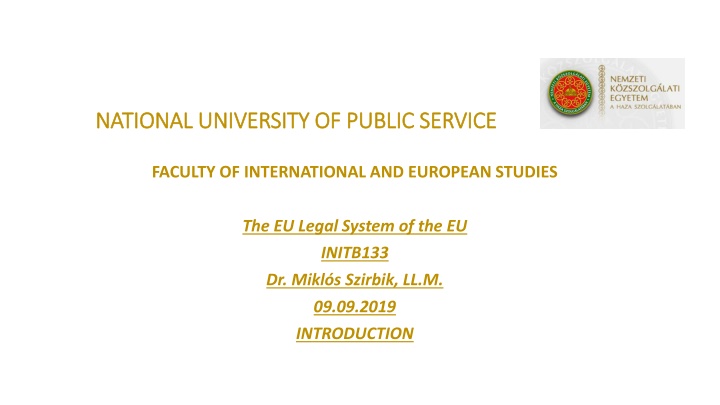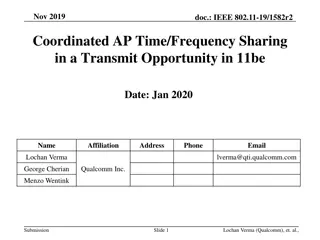Summary of V-MOD Business Meeting in Cap Town, South Africa
Topics discussed at the V-MOD business meeting in Cap Town, South Africa included data sources for field modeling, IGRF-13 plans, and updates on the World Digital Magnetic Anomaly Map (WDMAM). Key decisions were made regarding the evolution and definition of IGRF, as well as the release timeline for IGRF-13. Additionally, the current task force for WDMAM was re-elected, and new members joined, emphasizing the importance of maintaining and updating magnetic anomaly maps for research purposes.
Download Presentation

Please find below an Image/Link to download the presentation.
The content on the website is provided AS IS for your information and personal use only. It may not be sold, licensed, or shared on other websites without obtaining consent from the author.If you encounter any issues during the download, it is possible that the publisher has removed the file from their server.
You are allowed to download the files provided on this website for personal or commercial use, subject to the condition that they are used lawfully. All files are the property of their respective owners.
The content on the website is provided AS IS for your information and personal use only. It may not be sold, licensed, or shared on other websites without obtaining consent from the author.
E N D
Presentation Transcript
NATIONAL NATIONAL UNIVERSITY UNIVERSITY OF OF PUBLIC PUBLIC SERVICE SERVICE FACULTY OF INTERNATIONAL AND EUROPEAN STUDIES The EU Legal System of the EU INITB133 Dr. Mikl s Szirbik, LL.M. 09.09.2019 INTRODUCTION
Mikls Szirbik, Mikl s Szirbik, The EU Legal System and the Case Law The EU Legal System and the Case Law of the Court of Justice of the EU of the Court of Justice of the EU AGENDA 1. Introduction into legal systems of the EU 2. The EU Parliament 3. Rulings of the EU Court of Justice related to the EP
Mikls Szirbik, Mikl s Szirbik, The EU Legal System and the Case Law The EU Legal System and the Case Law of the Court of Justice of the EU of the Court of Justice of the EU Dr. Szirbik Mikl s LL.M. IBS, NKE Goethe University 2005, Frankfurt am Main 2005 FPS, Frankfurt am Main Europan Law Andr ssy University Budapest 2011 2011 GIZ Prime Minister s Office State Aid Monitoring Office 2012-2016
Mikls Szirbik, Mikl s Szirbik, The EU Legal System and the Case Law The EU Legal System and the Case Law of the Court of Justice of the EU of the Court of Justice of the EU Assessment
Mikls Szirbik, Mikl s Szirbik, The EU Legal System and the Case Law The EU Legal System and the Case Law of the Court of Justice of the EU of the Court of Justice of the EU Introduction into legal systems of the EU The EU has a legal system and law of its own (sui generis) - the main rules and principles are laid down in the founding Treaties. The EU can adopt legal and legislative acts, which the Member States have to respect and to apply. Compared to that, other organizations have much less law setting capacities: Articles 10 and 14 of the UN Charter refer to General Assembly resolutions as "recommendations however, they have impact on interpretation of legally binding sources of IPL
Mikls Szirbik, Mikl s Szirbik, The EU Legal System The EU Legal System and the Case Law of the Court of Justice of the EU and the Case Law of the Court of Justice of the EU 1. Sources of EU law Questions: A) How would you define the term source of law? B) What sources of law do you know in your countries C) What sources of international law do you know? D) As a result of the above: which are the sources of EU law?
Mikls Szirbik, Mikl s Szirbik, The EU Legal System The EU Legal System and the Case Law of the Court of Justice of the EU and the Case Law of the Court of Justice of the EU 1. Sources of EU law The two main sources of EU law are: primary law and secondary law. Primary law is constituted by treaties laying down the legal framework of the European Union. Secondary law is composed of legal instruments based on these treaties, such as regulations, directives, decisions and agreements. In addition, there are general principles of EU law, the case law developed by the European Court of Justice and international law.
Mikls Szirbik, Mikl s Szirbik, The EU Legal System The EU Legal System and the Case Law and the Case Law of the Court of Justice of the EU of the Court of Justice of the EU TFEU CHAPTER 2 LEGAL ACTS OF THE UNION, ADOPTION PROCEDURES AND OTHER PROVISIONS SECTION 1 THE LEGAL ACTS OF THE UNION Article 288
Mikls Szirbik, Mikl s Szirbik, The EU Legal System The EU Legal System and the Case Law and the Case Law of the Court of Justice of the EU of the Court of Justice of the EU Which acts in your national law remindyou on the following ones? Art. 288 TFEU To exercise the Union's competences, the institutions shall adopt regulations, directives, decisions, recommendations and opinions. A regulation shall have general application. It shall be binding in its entirety and directly applicable in all Member States. A directive shall be binding, as to the result to be achieved, upon each Member State to which it is addressed, but shall leave to the national authorities the choice of form and methods. A decision shall be binding in its entirety. A decision which specifies those to whom it is addressed shall be binding only on them. Recommendations andopinions shall have no binding force.
Mikls Szirbik, Mikl s Szirbik, The EU Legal System The EU Legal System and the Case Law and the Case Law of the Court of Justice of the EU of the Court of Justice of the EU Examples: Regulations - Regulation (EU) 2016/679 of the European Parliament and of the Council of 27 April 2016 on the protection of natural persons with regard to the processing of personal data and on the free movement of such data, and repealing Directive 95/46/EC (General Data Protection Regulation) (Text with EEA relevance) https://eur-lex.europa.eu/legal-content/EN/TXT/?uri=celex%3A32016R0679
Mikls Szirbik, Mikl s Szirbik, The EU Legal System The EU Legal System and the Case Law and the Case Law of the Court of Justice of the EU of the Court of Justice of the EU Examples: Directives - Directive 2014/24/EU of the European Parliament and of the Council of 26 February 2014 on public procurement and repealing Directive 2004/18/EC Text with EEA relevance https://eur-lex.europa.eu/legal-content/EN/TXT/?uri=celex%3A32014L0024
Mikls Szirbik, Mikl s Szirbik, The EU Legal System The EU Legal System and the Case Law and the Case Law of the Court of Justice of the EU of the Court of Justice of the EU Examples: Decisions (1) Greece Aluminum Case, (2) Poland- Aid scheme for compensation of damage caused by the floods in Poland http://ec.europa.eu/competition/state_aid/cases/234935/234935_1079057_10_1.p df http://ec.europa.eu/competition/state_aid/cases/237314/237314_1142520_25_2.p df
Mikls Szirbik, Mikl s Szirbik, The EU Legal System The EU Legal System and the Case Law and the Case Law of the Court of Justice of the EU of the Court of Justice of the EU The Procedure of law setting in the EU Article 289 TFEU 1. The ordinary legislative procedure shall consist in the joint adoption by the European Parliament and the Council of a regulation, directive or decision on a proposal from the Commission. This procedure is defined in Article 294. 2. In the specific cases provided for by the Treaties, the adoption of a regulation, directive or decision by the European Parliament with the participation of the Council, or by the latter with the participation of the European Parliament, shall constitute a special legislative procedure. 3. Legal acts adopted by legislative procedure shall constitute legislative acts. 4. In the specific cases provided for by the Treaties, legislative acts may be adopted on the initiative of a group of Member States or of the European Parliament, on a recommendation from the European Central Bank or at the request of the Court of Justice or the European Investment Bank.
Mikls Szirbik, Mikl s Szirbik, The EU Legal System The EU Legal System and the Case Law and the Case Law of the Court of Justice of the EU of the Court of Justice of the EU The Competences of the EU and the MS CATEGORIES AND AREAS OF UNIONCOMPETENCE Article 2 TFEU 1. When the Treaties confer on the Union exclusive competence in a specific area, only the Union may legislate and adopt legally binding acts, the Member Statesbeing able to do so themselves only if so empoweredby the Union or for the implementationof Union acts. 2. When the Treaties confer on the Union a competence shared with the Member States in a specific area, the Union and the Member States may legislate and adopt legally binding acts in that area. The Member States shall exercise their competence to the extent that the Union has not exercised its competence. The Member Statesshall again exercise their competence to the extent that the Unionhas decided to cease exercising its competence. 3. The Member States shall coordinate their economic and employment policies within arrangements as determined by this Treaty, which the Union shall have competenceto provide. 4. The Union shall have competence, in accordance with the provisions of the Treaty on European Union, to define and implement a common foreign and security policy,including the progressive framing of a commondefence policy. 5. In certain areas and under the conditions laid down in the Treaties, the Union shall have competence to carry out actions to support, coordinate or supplementthe actionsof the Member States,withoutthereby superseding their competencein these areas. Legally binding acts of the Union adopted on the basis of the provisions of the Treaties relating to these areas shall not entail harmonisation of Member States'laws or regulations. 6. The scopeof and arrangementsfor exercisingthe Union'scompetencesshall be determinedby the provisionsof the Treaties relating to each area.
Mikls Szirbik, Mikl s Szirbik, The EU Legal System The EU Legal System and the Case Law and the Case Law of the Court of Justice of the EU of the Court of Justice of the EU The Competences of the EU and the MS Article 3 TFEU 1. The Union shall have exclusive competence in the following areas: (a) customs union; (b) the establishing of the competition rules necessary for the functioning of the internal market; (c) monetary policy for the Member States whose currency is the euro; (d) the conservation of marine biological resources under the common fisheries policy; (e) common commercial policy. 2. The Union shall also have exclusive competence for the conclusion of an international agreement when its conclusion is provided for in a legislative act of the Union or is necessary to enable the Union to exercise its internal competence, or in so far as its conclusion may affect common rules or alter their scope.
Mikls Szirbik, Mikl s Szirbik, The EU Legal System The EU Legal System and the Case Law and the Case Law of the Court of Justice of the EU of the Court of Justice of the EU Article 4 TFEU 1. The Union shall share competence with the Member Stateswhere the Treatiesconfer on it a competencewhich does not relate to the areas referred to in Articles 3 and 6. 2. Shared competencebetween the Union and the Member Statesapplies in the followingprincipal areas: (a) internal market; (b) socialpolicy, for the aspectsdefined in this Treaty; (c) economic,socialand territorialcohesion; (d) agriculture and fisheries, excluding the conservationof marine biologicalresources; (e) environment; (f) consumerprotection; (g) transport; (h) trans-Europeannetworks; (i) energy; (j) area of freedom, security and justice; (k) commonsafety concernsin public health matters,for the aspectsdefined in this Treaty. 3. In the areas of research, technological development and space, the Union shall have competence to carry out activities, in particular to define and implement programmes; however, the exercise of that competence shall not result in Member Statesbeing prevented from exercising theirs. 4. In the areas of development cooperation and humanitarian aid, the Union shall have competence to carry out activities and conduct a common policy; however, the exercise of that competenceshall not result in MemberStatesbeing prevented from exercisingtheirs.
Mikls Mikl sSzirbik, Szirbik, Public PublicLaw Law of of the theEuropean European Union Union The European Parliament
Mikls Szirbik, Mikl s Szirbik, The EU Legal System The EU Legal System and the Case Law and the Case Law of the Court of Justice of the EU of the Court of Justice of the EU History of EP 1952-1957: Consultative Assembly Its members were elected by the national parliaments of the MS. As indicated in the name, it had to be heard by the Council while lawsetting but it did not create the itself the European legal sources. In 1979 shortly after the 1957 Treaties the EP was elected directly for the first time and it broadened its importance continuously. Today it is a co-legislative organ.
Mikls Szirbik, Mikl s Szirbik, The EU Legal System and the Case Law The EU Legal System and the Case Law of the Court of Justice of the EU of the Court of Justice of the EU David Sassoli, EPP since 17 January 2017
Mikls Szirbik, Mikl s Szirbik, The EU Legal System and the Case Law The EU Legal System and the Case Law of the Court of Justice of the EU of the Court of Justice of the EU European Court of Justice decides in favor of European Parliament in cod case - Case C-124/13 https://eur-lex.europa.eu/legal- content/EN/TXT/?uri=uriserv:OJ.C_.2013.156.01.0021.01.ENG http://ebcd.org/european-court-of-justice-decides-in-favor-of- european-parliament-in-cod-case/
Mikls Szirbik, Mikl s Szirbik, The EU Legal System and the Case Law The EU Legal System and the Case Law of the Court of Justice of the EU of the Court of Justice of the EU European Court of Justice decides in favor of European Parliament in - Case C-73/17 (France v. EP)
Thank you for your attention! Thank you for your attention!






















